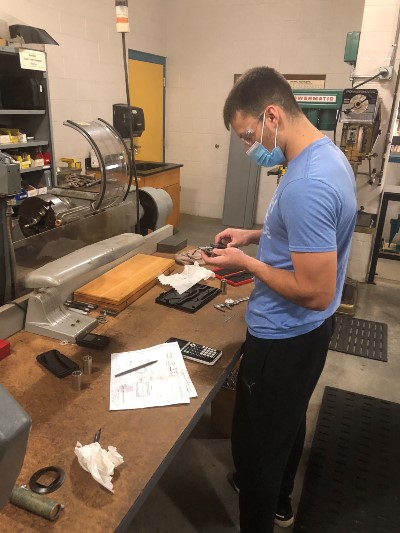Monday, October 19, 2020
Category: Topical
“We haven’t slowed down”
By Carla Kelly ’22
COVID-19 has shut down, postponed and suspended life for the better part of 2020. Goals have gone unmet as a result of the global pandemic that has interrupted people’s lives for over half a year. However, in the midst of uncertainty, places like Messiah University’s Collaboratory—affectionately known as the Collab—are reminders of how service and partnership can bring about true change, regardless of the circumstances.

The Collaboratory at Messiah serves a special purpose for several communities, both inside and outside the University. A project-based center that implements strategic partnerships and applied research, students at the Collab simultaneously apply academic knowledge and express their faith through service in a variety of projects around the world.
The Collaboratory’s new director
Dr. Darren Hercyk, director for the Collaboratory, served cross-culturally prior to his time at Messiah. He and his family served in 10 different countries in the last 18 years. This journey began for Hercyk in China as a mechanical engineer, where he privatized a manufacturing facility. When he returned to the United States, Hercyk earned his Doctor of Ministry degree with a focus on preparing students and the church for global engagement. “The Collaboratory operates at the intersections of global missions, engineering, and scholarship,” Hercyk said when asked about what drew him to Messiah.
Continuing on
Hercyk says that while the Collaboratory may have adjusted their plans and how they carry them out during COVID-19, they haven’t stopped working and serving.
One unique aspect of the Collab’s work is that it is long term. Community partners help maintain and look after these projects, even during a global pandemic. “For the communities served by the Collaboratory, the challenges they faced before COVID-19 still exist through the pandemic and beyond,” Hercyk said. “With that, the work of the Collaboratory is important as ever.”
While Collab teams aren’t able to travel as they used to, the team continues to work on engineering solutions. Though confined to completing work on campus, Hercyk shared some projects still in progress. “The Collaboratory is currently working on projects ranging from engineering a 3D printing system for the manufacturing of orthotic braces and prosthetic sockets at a hospital in Kenya, to designing and installing a pedestrian bridge for a rural community in Panama,” he added. The long-term orientation of these projects is what distinguishes the Collabratrory from charities or other programs. The desire to go the extra mile in order to better serve the community is evident in the overall mission of the program and in the efforts being made to continue the projects they began in the midst of COVID-19.
One current project of the Collaboratory is is the development of an egg incubator. The Nahumba Mission in Choma, Zambia has 150 chickens that are producing fertilized eggs, but there aren’t sufficient incubators for them. The Collab team partnered with Tony Beers, alumnus of the Brethren in Christ World Missions, and the Brethren in Christ Church in Zambia to develop the high-quality, low-cost device that will help support the church and the local community.
The Clubfoot Brace project, featuring a collaboration of three students in three separate disciplines—Luke Groothoff (art), America Cerventes (applied health science) and Michelle Lo (biomedical engineering)—is another project which is continuing despite the hardships of a global pandemic. Led by Leigha Southall, a junior engineering major; Assistant Professor of Engineering Dr. Emily Farrar; and Senior Lecturer Tim Howell, the students are working together with project partner CURE International. They are creating a line drawing rendering of the biomechanical forces that the Cunningham Clubfoot brace exerts on the anatomy of the infant lower limb, specifically on each bone of the foot.
In all, there are 108 junior and senior engineering students, and 13 faculty advisors, that are currently assigned to projects within the Collaboratory. The Collab also has 75 freshmen and sophomores in other majors, who are volunteering on the teams.
If students are interested in volunteering with the Collaboratory, contact Lori Zimmerman via email at lzimmerman@messiah.edu.